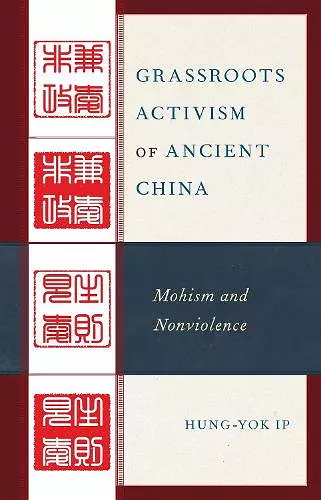Grassroots Activism of Ancient China
Mohism and Nonviolence
Format:Hardback
Publisher:Lexington Books
Published:24th Feb '22
Currently unavailable, and unfortunately no date known when it will be back

This book examines Mohism as a movement in early China, focusing on the Mohists’ endeavor to create power for themselves. Fashioning themselves as grassroots activists who practiced transgrassroots activism, the Mohists hoped to impact the elite by gaining entry in its community, and by influencing it from within. To create a less violent world, they deployed the strategies of persuasion and strategy but did not discard counterviolence in their dealings with the ruling class. To execute their activism, the Mohists produced knowledge that they thought would enable them to employ their nonviolent strategies as well as to mount armed resistance to aggression. Moreover, to ensure that they were capable of practicing their transgrassroots movement so as to change the elite and the world, the Mohists paid significant attention to their personhood, developing a self-cultivation tradition which encouraged the Mohists to move beyond human conditions for self-improvement. The book concludes by situating Mohism in the history of nonviolent activism, and in that of negotiation and conflict resolution.
Dr. Ip provides a detailed examination of how the Mohists, a nonviolent and understudied social movement in ancient China, fought for social, economic, and political justice for the oppressed in society using negotiation processes. Working from a weak position in comparison to the ruling elites, the Mohists used a variety of non-adversarial negotiation and persuasion tactics—very unusual and experimental in their times—that focused on achieving collaboration to realize their goals. This interesting book brings the philosophy and tangible activities of this early group to life in a way that can definitely enhance today’s negotiation research and practice surrounding citizen-led activism on behalf of civil rights and justice.
-- Bertram I. Spector, Editor-in-Chief, International Negotiation: A Journal of Theory and PracticeThough less well known, Mozi is as important a figure as Confucius for their time (ca. 500–400 BC). Mozi remains within the realm of Confucius’ thought and language but offers a sharp original critique of certain Confucian concepts such as heaven (tian) and benevolence (ren). To Mozi’s teachings Hung-yok Ip offers a solid, useful, and reader-friendly introduction that will serve well the needs of most undergraduate classes on early Chinese philosophy. Ip’s effort to include Mozi in the broader category of activists against violence (such as Gandhi) is a stimulating new approach of particular relevance for our own time.
-- Moss Roberts, New York UniverISBN: 9781793622341
Dimensions: 227mm x 162mm x 28mm
Weight: 612g
294 pages